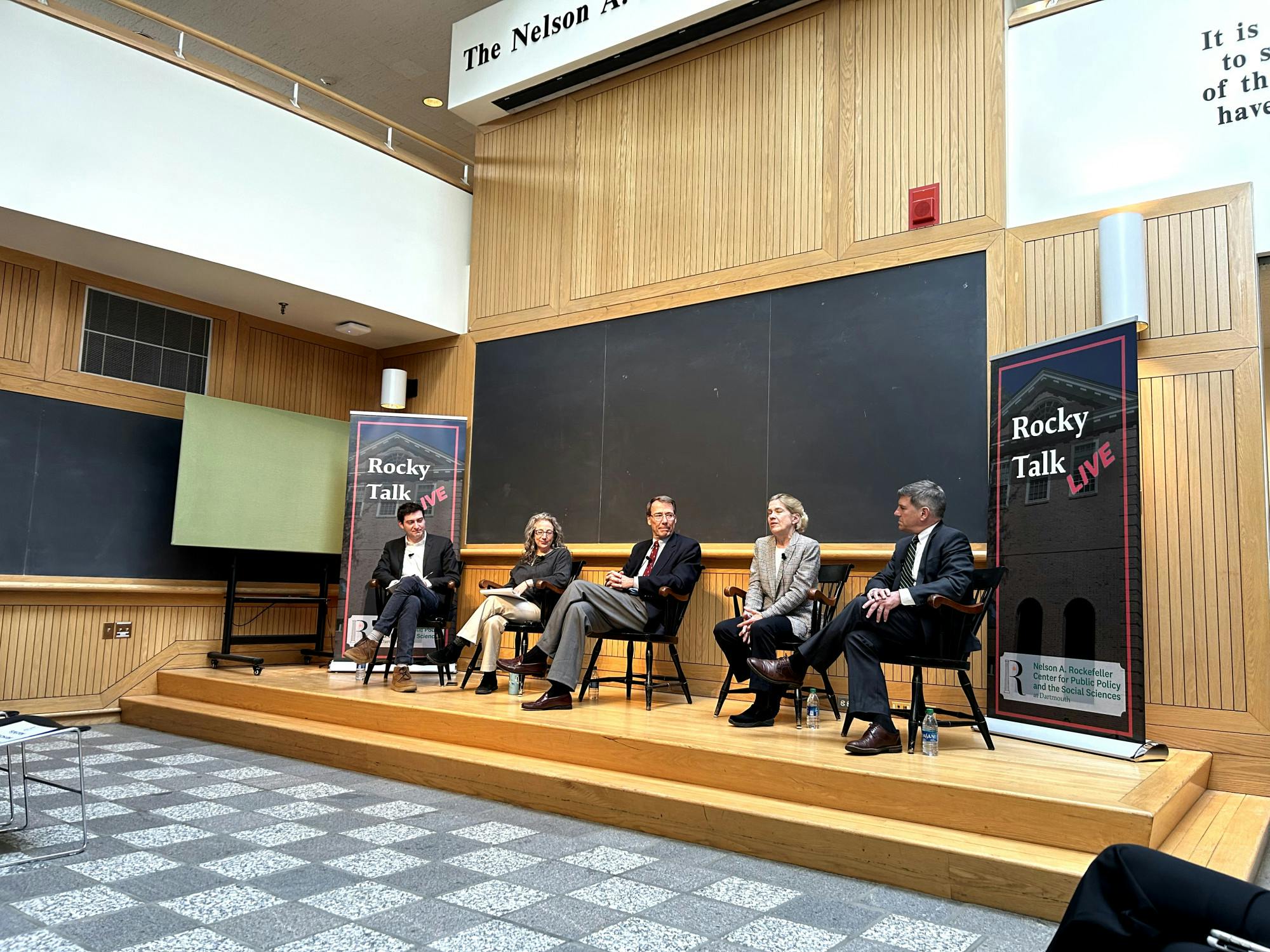On May 25, the Rockefeller Center for Public Policy invited three state court judges and Dartmouth alumni — New Hampshire associate justice James Bassett ’78, New Hampshire judge Christopher Keating ’86 and New Jersey associate justice Anne Patterson ’80 — to share their insights about the “powerful and controversial” roles of judges in American politics, according to the College President’s Office website.
The event was moderated by Writing and Rhetoric Institute lecturer Julie Kalish ’91, who began the hour by asking the judges to introduce themselves.
During the event, Bassett said he practiced law in Concord, New Hampshire, for 27 years, representing Dartmouth and the Dartmouth Hitchcock Medical Center, as well as The New York Times and other news organizations — for which he advocated in favor of permitting cameras in the courtroom. Bassett received a gubernatorial nomination to serve on the New Hampshire Supreme Court 11 years ago, after pitching himself as someone who would contribute an interesting perspective due to the large number of cases he had tried in front of the court.
Keating said he worked as a public defender in New Hampshire before serving as the College Affairs Office’s executive director for 10 years. He described the latter position as “the greatest experience of [his] life,” explaining that the office has 120 lawyers in the state and represents thousands of clients. After leaving the College, Keating said that he ran the Granite State’s judicial councils — which advise the government on how to structure the justice system to best meet community needs — for five years, before receiving his nomination to serve on the New Hampshire Court.
After becoming involved in government as a deputy attorney general and special assistant to the attorney general in New Jersey, Patterson said she also gravitated towards the legal field, serving as deputy attorney general and special assistant to the attorney general in New Jersey. She said she focused on product litigation and intellectual law before serving on the Bar Association, adding that she was “stunned” to receive a gubernatorial nomination in 2011 to serve on the NJ Supreme Court.
After introductions, the judges discussed the polarizing nature of the US Supreme Court, which Kalish said has shaped public perceptions given extensive media coverage on the issue.
Bassett corroborated that the public’s views of the judicial system are dominated by its view of the Supreme Court, even though most direct interactions with the judicial system occur at the local level.
“Just in New Hampshire, we have about 350,000 cases filed in our system every year, and the federal courts in New Hampshire have less than 1,000 cases,” he said. “So the place where most people are going to interact with the judicial system is the state court system, making it incredibly important. I tip my hat to [Keating] and his trial colleagues because we are incredibly under-resourced compared to the federal judges.”
Kalish then asked about competing philosophies on the court: for example, whether judges should strike down actions that are inconsistent with their interpretation of the Constitution, or whether they should be bound by the original intent of the framers and text of the Constitution.
Patterson responded that judges undertake distinct roles, distinguishing between the work of judges serving on trial courts versus those serving on the state Supreme Court.
“There are pressures on trial judges every day,” Patterson said. “Bassett and I have the luxury of going back to our chambers and looking at the law and thinking about how we want to phrase something and agonizing over the words of opinions. Trial judges [like Keating] have to make on-the-spot decisions under incredible pressure in front of juries, with the complications that a jury’s presence creates in a courtroom.”
The judges also agreed that state judges’ roles depend not on interpreting state constitutions themselves, but rather on interpreting the words of the legislature — an often challenging task, given the volunteer-based nature of the New Hampshire legislature. Since senators and representatives are occupied with their full time jobs, they often lack prior experience in the law and must juggle their commitments.
“We get some legislation that’s hard to sort out in front of us and we do our best — that’s our job,” Bassett said. “At the end of the opinion, we say, ‘we have tried to discern the attempt of the legislature, but legislature, if you think we got it wrong within the bounds of the Constitution, feel free to correct our interpretation.’”
The discussion then opened for audience questions. One student asked the judges whether some cases are more difficult to adjudicate than others. All three agreed that most cases are challenging since those are the ones judges elect to evaluate.
“We have a discretionary docket, which means we choose the cases we hear, and most are those where you can make a principled argument on both sides,” Patterson said. “As a result, we are choosing cases where the merits are close. It’s hard for me to pick out a few difficult cases because important government issues and policy considerations come to us on constitutional challenges, and they’re all extremely difficult.”
Keating added that judging is challenging due to the repercussions of judges’ decisions on individuals’ lives, citing cases involving issues such as homelessness and educational inequalities.
“We just cleared out a homeless site — 120 people had been living there all winter, and addiction problems running through that community left a lot of children without parents and guardianship cases for us to evaluate,” he said. “Everything is super hard, so I’d love to be able to say there are easy cases, but there aren’t.”
The judges ended the session with advice for Dartmouth students, such as encouraging them to pursue future careers in law.
“I’ll make a pitch for the law — there’s no surprise there,” Patterson said. “Law school is a difficult commitment — it’s three years and I can see weighing that against other options, but law degrees will make you stronger and more capable of helping people ... since lawyers are doing terrific work in all fields. I think it’s as rewarding a profession as it could be.”
Patterson also noted that “lawyers generally want to die at their desks” — “a tribute to the profession.”
Event organizer and government professor Herschel Nachlis later called engagement with sitting judges “a rare privilege.”
“It’s a testament to Dartmouth’s amazing alumni that Justices Bassett and Patterson and Judge Keating made the time to visit and to speak privately with many students at both a student lunch and a student dinner,” he said.
Esme Lee ’24, who attended the event, said she thought it was “informative” and that she appreciated “[Judge Keating’s] concluding note of wisdom about Dartmouth students taking up careers to influence and serve those disadvantaged and marginalized in society.”




